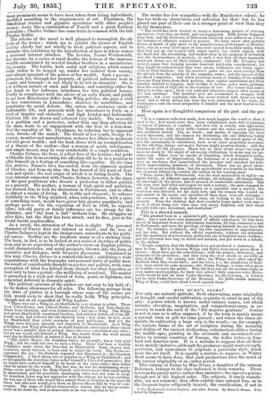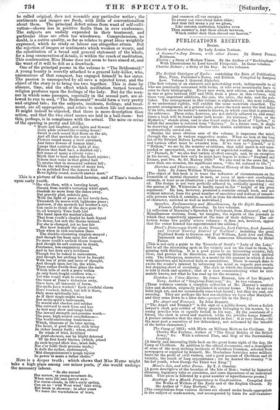MISS HUME'S POEMS. *
NOT only are natural aptitude, fresh observation, some originality of thought, and careful cultivation, requisite to excel in any of the arts : a power which is known under various names, but which includes elevation imagination, and comprehensiveness, is ne- cessary to reach the rank of the " Dii majores gentium." Genius is not so rare as is often supposed, if by the term is merely meant a natural turn or gift for some pursuit ; and where the times sti- mulate its cultivation a large crop is the result,—as, for example, the various forms of the art of sculpture during the maturity and decline of the ancient civilization, ecclesiastical edifices during the middle ages painting in the sixteenth and seventeenth cen- turies in several countries of Europe, the belles lettres in Eng- land and America now. It is a mistake to suppose that all these were merely imitative, although the producers might want strength, greatness, and earnestness to originate a particular style, much more the art itself. It is equally a mistake to suppose, as Walter Scott seems to have done, that such productions have the merit of the coarser originality of an earlier period. This volume of Poems by Miss Hume, a daughter of the veteran Reformer, belongs to the class indicated in these remarks. There is a turn for poetry native rather than imitative ; the sign of a genius, though not of the highest order. The subjects, if rarely remark- able, are not common ; they often exhibit some natural bias, as in the frequent topics religiously treated; the versification, if not to
• The Bridesmaid, Count Stephen, and other Poems. By Mary C. Hume. Pub- lished by Chapman.
be called original, does not resemble any particular writer ; the sentiments and images are fresh, with little of conventionalism about them. The principal defect arises from want of self-culti- vation—shown less in positive faults than in over exuberance. The subjects are unduly expanded in their treatment, and particular ideas are often too wiredrawn. Comprehension, no doubt, is a native quality, so far as relates to great ideas weightily expressed, which no study or labour can altogether attain. But the rejection of images or sentiments which weaken or weary, and the substitution of a broad and general statement of the whole, for a long enumeration of details, is within the reach of meditation. This condensation Miss Hume does not seem to have aimed at, and the want of it will be felt as a drawback.
One of the principal poems in the volume is "The Bridesmaid." A young beauty is secretly attached to a general lady-killer, who, unconscious of that conquest, has engaged himself to her sister. The passion is unsuspected by all save a rejected lover, and the object of the story is to bring the two together. This is done by absence, time, and the effect which meditation turned towards religion produces upon the feelings of the lady. But for the man- ner in which some passages, especially in the second part, are al- lowed to run to seed, "The Bridesmaid" would form a very pretty and original tale ; for the subjects, incidents, feelings, and treat- ment, are all appropriate, and relate to modern life and manners. It might indeed be objected, that there is more description than action, and that the two chief scenes are laid in a ball-room ; but this, perhaRs, is in compliance with the actual. The mise en scene of the opening is pretty and lifelike. "Music and laughter, and lights and flowers! Gaily glide onward the evening hours! Sweet is each sound that floats on the air, And all that meeteth the eye is fair : Flowers round many a brow entwined, And fairer flowers of human kind ; Lamps that outrival the light of day, Mirrors that flash back a doubled ray ; Soft tones of many a silvery voice ; Mirth that to hear makes the heart rejoice ; Echoes that wake in that gilded hall To strains that in measured cadence fall ; While the whirring sound of many feet, As on polished floor the dancers fleet Move lightly round, maketh answer meet."
This is a picture of the reconciled heroine, and of Time's touches
upon early youth.
"She who then, with a bursting heart, Shrank from mirth's torturing whirl apart, Stealeth no more from the dance away, But gravely glad, sedately gay, With the light of peace on her lovely face, Threadeth its mazes with lightsome grace; And now, if she meeteth her brother's eye, Can smile to think of the days gone by. So all benignly Time hath laid His hand upon the maiden's head, That from youth's chaplet he hath frayed No flower, but reit the thorns instead. For she is changed, yet no less fair Her brow beneath the glossy braid, Than when in rich confusion there The thickly-clustering ringlets strayed ; And though the hues upon her cheek No more youth's earliest bloom bespeak, And though its soft contour be found, Perchance, leas exquisitely round, And in her dark eye's loveliness Though fire be tamed to earnestness, And though her arching brow be fraught With less of pride and more of thought, And though upon her lip, the while, There rather dwells than plays the smile Which tells of such a peace within
As only hard-fought conflicts win,—
Yet who would wish to sweep away One trace of Time's victorious sway, Since here, all innocent of harm, His spells have worked ? Each youthful charm Have touched, indeed, but left it there, Only more spiritually fair ; As if their magic might were lent But as the spirit's instrument, To mould and chasten and subdue The outward to such form and hue As best may show and image forth
The inward strength and genuine worth— The pure, high-souled unselfishness— The world-embracing tenderness—
Which, blossoms of its later spring, The heart, if good the soil, doth bnng In richer beauty forth; when, stirred By winds of trial, fertilized By grief-showers, nor by blight deterred Of its first hasty blooms, (which, prized As such beyond their 'due, must fade,
Nor e'er fulfil their promise made,)
It doth the rather, undismayed, 'Mid disappointment's pangs rejoice
In power to make a better choice."
Here is a deeper truth ; which shows that Miss Hume might
take a high place among our minor poets, if she would undergo
the necessary labour.
" So she nursed
Her sorrow, as young mourners do, When unto life and Borrow new. For storm-clouds, in life's early spring, Can on no 'wild West wind' take wing, Bat break in showers : in after years We learn the wastefulness of tears, And summon all our energies To sweep our care-cloud laden skies; And thus full many a joy we glean, Like autumn sunbeams, brighter even Than summer's, lent those clouds between, Which rather deck than shroud our heaven."



























 Previous page
Previous page